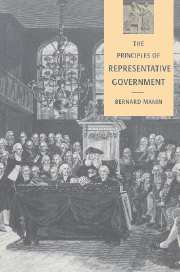Book contents
5 - The verdict of the people
Published online by Cambridge University Press: 08 March 2010
Summary
A number of twentieth-century authors have put forward theories of democracy that have been categorized (mostly by their critics) as elitist. The first and most influential of these was advanced by Joseph Schumpeter. Such theories employ the term democracy to denote political systems of the type in place in Britain, the United States, or France – that is to say, governments we refer to here as representative.
These theories have been termed elitist not because they stress the qualitative superiority of representatives over those they represent (in the sense defined in the previous chapter), but because they highlight another difference, presented as essential, between representative government and government by the people. It has been pointed out, not without justification, that the epithet “elitist” illbefits such theories, that it mistakenly connects them to the explicitly elitist conceptions of Gaetano Mosca or Vilfredo Pareto, for example, and finally that the term has more to do with political polemics than with scholarly analysis. It is true (to take only the forerunner of such theories) that Schumpeter does not use the concept of elites. He is not interested in the characteristics of representatives and makes no reference to Mosca or Pareto. One can understand, nonetheless, why many authors have characterized Schumpeter's definition of democracy as elitist.
Schumpeter stresses that, in contrast to what is assumed by the ‘classical’ conception of democracy, the empirical reality of representative democracies is not that the electorate makes decisions on public affairs. Elections, Schumpeter argues, do not express any popular will concerning policies.
- Type
- Chapter
- Information
- The Principles of Representative Government , pp. 161 - 192Publisher: Cambridge University PressPrint publication year: 1997

